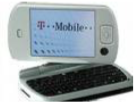Déjà vu all over again: T-Mobile’s Sharp Sidekick 3
As the mobile phone market has become saturated, with voice calls becoming a commodity item, service providers not unreasonably looked to find new sources of revenue, while phone manufacturers have looked to provide terminals for the new services.
As these services have become more popular and more profitable, there has been an increase in emphasis on network (or other) appliance function and a de-emphasis in voice communications. In some cases the emphasis has been on using the terminal as a PDA. In other cases it has been on using the device for getting and receiving e-mail. Some have aimed at providing entertainment centers , complete with MP3 players, FM radios, cameras, and video recording and playing. The T-Mobile Sidekick 3 is aimed at people who send a lot of text messages. It also includes a camera and an MP3 player, as well as a speakerphone and the ability to use a Bluetooth headset. It has a SAR of 0.5, which is good.
, complete with MP3 players, FM radios, cameras, and video recording and playing. The T-Mobile Sidekick 3 is aimed at people who send a lot of text messages. It also includes a camera and an MP3 player, as well as a speakerphone and the ability to use a Bluetooth headset. It has a SAR of 0.5, which is good.
We send a lot of messages, so at first glance this looked like an attractive choice. And, if we were thirteen years olds who never traveled abroad, and never needed to make a phone call, this device would indeed be high on our list.
Unfortunately, we are long past our teenage years, and do travel. What we were hoping for was a phone that additionally had the ability to send messages with greater ease. What we found in the Sidekick 3 is a device whose underlying GSM technology is half a decade out of date.
If you are a grownup that travels, and are considering the Sidekick 3, be aware that, as of the last time we checked:
You will have NO GSM coverage in Andorra, Angola, Azerbaijan, Bangladesh, Bhutan, Bosnia and Herzegovina, Botswana, Brunei Darussalam, Burkina Faso, Burundi, Cambodia, Cameroon, Cape Verde, Central African Republic, Chad, China, Comoros, Congo, Cook Islands, Côte d’Ivoire, Croatia, Cuba, Djibouti, East Timor, Egypt, Equatorial Guinea, Eritrea, Ethiopia, Faroe Islands, Fiji, French Polynesia, Antigua and Barbuda, Gabon, Gambia, Ghana, Gibraltar, Greenland, Guernsey, Guinea, Guinea Bissau, Guyana, Iran, Iraq, Isle of Man, Jordan, Kazakhstan, Kenya, Kiribati, Korea (North), Kyrgyzstan, Lebanon, Lesotho, Liberia, Libya, Macedonia, Madagascar, Malawi, Maldives, Mali, Mauritania, Mauritius, Micronesia, Moldova, Monaco, Mongolia, Morocco, Myanmar, Nepal, New Caledonia, New Zealand, Niger, Oman, Pakistan, Palestinian Territory, Papua New Guinea, São Tomé and Príncipe, Saudi Arabia, Senegal, Seychelles, Sierra Leone, Swaziland, Togo, Tonga, Tunisia, Turkmenistan, United Arab Emirates, Vanuatu, Venezuela, Vietnam, Yemen, Zambia, and Zimbabwe (six of which countries members of our team have visited this year).
You will have INCOMPLETE GSM coverage in Afghanistan, Albania, Algeria, Argentina, Armenia, Aruba, Australia, Austria, Bahrain, Barbados, Belarus, Belgium, Benin, Brazil, British Virgin Islands, Bulgaria, Cayman Islands, Congo (Democratic Republic of the), Cyprus, Czech Republic, Denmark, Dominica, El Salvador, Estonia, Finland, France, French West Indies, Georgia, Germany, Greece, Grenada, Hong Kong (China), Hungary, Iceland, India, Indonesia, Ireland, Israel, Italy, Jamaica, Jersey, Kuwait, Laos, Latvia, Liechtenstein, Lithuania, Luxembourg, Macau (China), Malaysia, Malta, Mozambique, Namibia, Netherlands, Netherlands Antilles, Nigeria, Norway, Philippines, Poland, Portugal, Qatar, La Reunion, Romania, Russia, Rwanda, Serbia and Montenegro, Singapore, Slovakia, Slovenia, Somalia, South Africa, Spain, Sri Lanka, St Lucia, St Vincent and the Grenadines, Sudan, Suriname, Sweden, Switzerland, Syria, Taiwan, Tajikistan, Tanzania, Thailand, Turkey, Uganda, Ukraine, United Kingdom, and Uzbekistan (13 of which countries members of our team have visited this year).
On the bright side, you will at least have full GSM coverage in Anguilla, Bahamas, Belize, Bermuda, Bolivia, Canada, Chile, Colombia, Costa Rica, Dominican Republic, Ecuador, Guam, Guatemala, Honduras, Mexico, Montserrat, Nicaragua, Panama, Paraguay, Peru, St Kitts and Nevis, Trinidad and Tobago, Turks and Caicos Islands, United States, and Uruguay (7 of which countries members of our team have visited this year).
It is our understanding that moving from the obsolete tri-band chipset used to a current-technology quad-band chipset could have increased the manufacturing costs of this $350 device by up to a whole dollar!
Nonetheless:
• Danger should be ashamed of designing a telephone using technology that has been obsolete for half a decade.
• Sharp should be ashamed of manufacturing a telephone using technology that has been obsolete for half a decade.
• T-Mobile should be ashamed of accepting a design based on technology that has been obsolete for half a decade.
• Reviewers should be ashamed of not mentioning that the design of this telephone uses technology that has been obsolete for half a decade.
• Purchasers – even unsophisticated children – should be ashamed to be seen carrying a terminal that uses technology that has been obsolete for half a decade.

